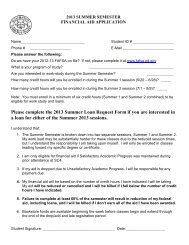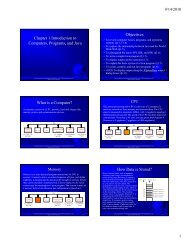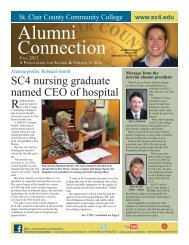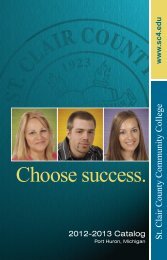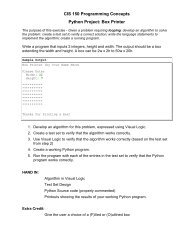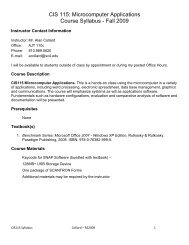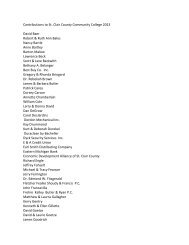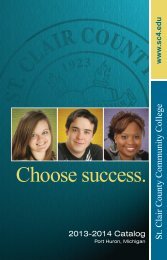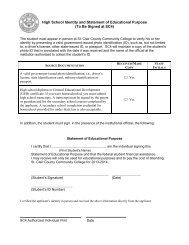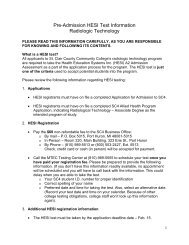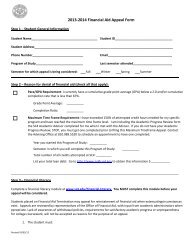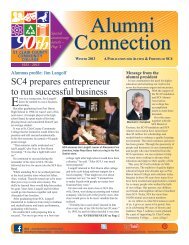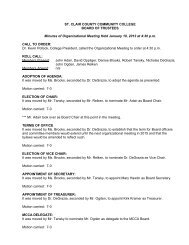student code of conduct - St. Clair County Community College
student code of conduct - St. Clair County Community College
student code of conduct - St. Clair County Community College
You also want an ePaper? Increase the reach of your titles
YUMPU automatically turns print PDFs into web optimized ePapers that Google loves.
SEXUAL HARASSMENT<br />
Sexual harassment or related retaliation is strictly prohibited on<br />
campus and in college affiliated activities. Prohibited <strong>conduct</strong> includes,<br />
but is not limited to, unwelcome verbal or physical acts that are<br />
sexual in nature, unrelated to the content or context, and sufficiently<br />
severe and/or pervasive as to objectively either (a) have the effect<br />
<strong>of</strong> unreasonably interfering with an individual’s work or academic<br />
performance, or (b) create an intimidating, hostile or <strong>of</strong>fensive learning<br />
or working environment. Sexual harassment includes, but is not limited<br />
to, sexually based unwelcome verbal remarks or physical advances,<br />
request for sexual favors, inappropriate and unwelcome contact, and<br />
explicitly or implicitly stating that submission or rejection <strong>of</strong> sexual<br />
acts or advances will be a factor in one’s employment, participation or<br />
evaluation within the <strong>College</strong> and/or its activities.<br />
Any form <strong>of</strong> harassment is unacceptable at <strong>St</strong>. <strong>Clair</strong> <strong>County</strong> <strong>Community</strong><br />
<strong>College</strong>, and complaints or charges will be followed through with<br />
appropriate action. SC4 employees and <strong>student</strong>s are individually<br />
responsible to ensure such harassment does not occur. Concerns<br />
should be directed to the Human Resources Office, Room 203, Main<br />
Building.<br />
DISHONESTY – ACADEMIC<br />
The college considers academic honesty to be essential to all<br />
academic performance. Instances <strong>of</strong> academic dishonesty will be<br />
treated as serious <strong>of</strong>fenses <strong>of</strong> the <strong>St</strong>udent Code <strong>of</strong> Conduct. <strong>St</strong>udents<br />
involved in activities such as cheating and/or plagiarism will be subject<br />
to disciplinary action up to and including dismissal.<br />
• Definition <strong>of</strong> plagiarism: Plagiarism is the appropriation <strong>of</strong><br />
language, thoughts or ideas <strong>of</strong> another author and claiming that<br />
as one’s own. Plagiarism is work not produced by the <strong>student</strong>, or<br />
work that does not credit borrowings from the original source(s).<br />
• Definition <strong>of</strong> cheating: Cheating can be, but is not limited to,<br />
a <strong>student</strong> using electronic technology, notes or other written<br />
materials not permitted by the instructor; looking at other<br />
<strong>student</strong>s’ papers without the instructor’s permission; requesting<br />
answers from other <strong>student</strong>s; or working with other <strong>student</strong>s when<br />
independent work is required. Situations where cheating may<br />
occur are during tests, exams, quizzes or other similar methods<br />
<strong>of</strong> evaluation.<br />
When the instructor has sufficient evidence <strong>of</strong> cheating or plagiarism,<br />
the instructor may impose disciplinary actions such as assigning a<br />
failing grade to the <strong>student</strong>’s assignment, quiz, paper or test.<br />
178



